Traveling with a laptop opens you up to plenty of new risks that you would not encounter while working at home. Modern machines are stylish and desirable and there for a big attraction for thieves.
In this post, I want to just share with you a few tips on how to keep your laptop safe while traveling.
You may also enjoy:
- Best International Travel Surge Protector
- Best Gifts For Traveling Businessmen
- Traveling With Golf Clubs
- Can You Use a Tablet on a Plane? | Flying With Gadgets And FAQs
Coming your way in this post - click to expand ->
1. Protect your laptop from physical damage
It goes without saying that we are all aware of the threat that thieves pose, but what about if the biggest risk to your laptop is you? Here’s a couple of examples.
You’re running a little late (not that that would ever happen to me) and you don’t quite do your bag up properly. As you dash wooosh, the laptop comes out and bounces on the floor.
Or, you look at the time, and you’re nearly late, in a rush you put your computer in its bag but horror, as you turn you know the last sips of coffee all over it and fzzzzst, gone.
You see, it’s you you have to worry about.
However, having a good quality laptop bag can help relieve these issues and much more. Look for one with that has padding around the laptop sleeve in case you tend to drop your bag. Also consider a waterproof bag (especially if traveling to England, it always rains there).
A few other points to look for in a secure laptop bag is slash-proof fabric and durable zippers. Also having a checkpoint-friendly laptop bag will help you slip your laptop in and out and breeze through security like a pro.
One final point I want to mention while talking about how to protect your laptop from physical damage is that the most vulnerable part is the screen. If this breaks, it’s new laptop time. It is possible to get a pretty cheap screen protector to save your laptop from unnecessary scratches.
Some screen protectors also act as privacy filters. These hide the screen from people looking at it from an angle. Perfect if you want to hide what you’re working on from prying eyes in a public place.
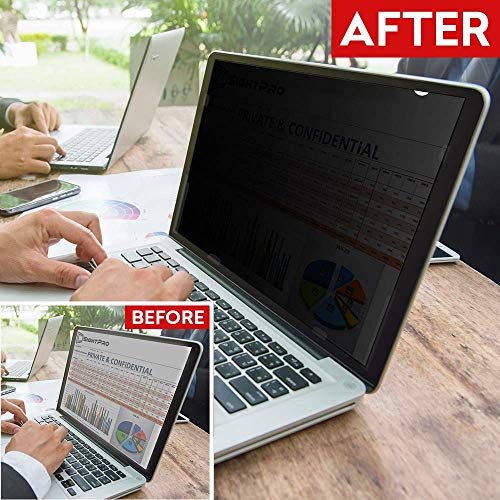
2. Know what to do in hotel rooms
Though you travel everywhere with your laptop, it’s not always possible to have it on you at all times. While many valuable possessions such as phones and wallets are small and will slip into your pocket, it would take pretty big trousers to slip a laptop in. So it may be the case that you have to leave your laptop in your hotel room.
While there will always be a small amount of risk involved, you can reduce this by hiding it at the bottom of your luggage or a different safe place and use “Do Not Disturb” sign on the door. Also, consider what’s coming next . . .
3. Get a security cable lock
A security cable lock is an anti-theft device that is cheap yet useful. It works like a bicycle lock. You can loop the cable around any object, connect it to your laptop and lock it with a password or key.
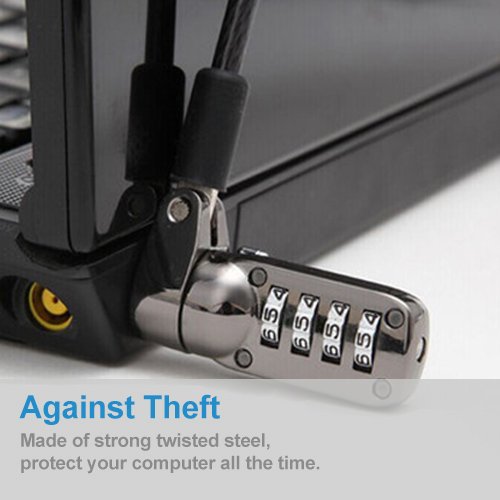
You can now purchase high-end locks that have a motion sensor and an alarm with it. So when someone pulls the laptop from you when you are not awake, the lock senses the movement and produces the alarm sound to alert you.
These are perfect if you are working in a cafe or co-working space and you want to nip to the bathroom or for securing your laptop in your hotel room while popping out for an evening stroll.
4. Invest in decent travel insurance
I get it, insurance sucks, I hate buying it too. It’s like throwing your money away on something that you will likely not need. But since my trip to Asia got cut short due to a family illness back home, I always recommend having travel insurance. You never know when you might need it.
When you are shopping around, be sure to choose a policy that covers the loss of items and theft. Also, make sure you know that the insurance coverage will cover the cost of a new laptop should the worst happen.
5. Use an antivirus software
Each time you travel, you will be exposed to new and unfamiliar WiFi networks that can threaten your laptop and files. Be sure to use a robust antivirus platform and ensure it is kept up to date.
If possible, avoid using public WiFi networks for online banking and shopping online. If it is for an emergency, such as you forgot it was your mum’s birthday and need to order a gift, make sure you have a secure connection.
Check that your browser shows the security symbol or the URL starts with “https.”
6. Consider using a VPN
This is kind of a continuation of the previous precaution. If you tend to use public WiFi networks often, you can consider using a Virtual Private Network (VPN).
This is a service that encrypts all data that is sent and received to ensure your internet connection is secure. Many antivirus providers offer a package that includes a VPN subscription. Also, look for ones that cover multiple devices so you can keep your phones and tablets secure and save on multiple subscriptions.
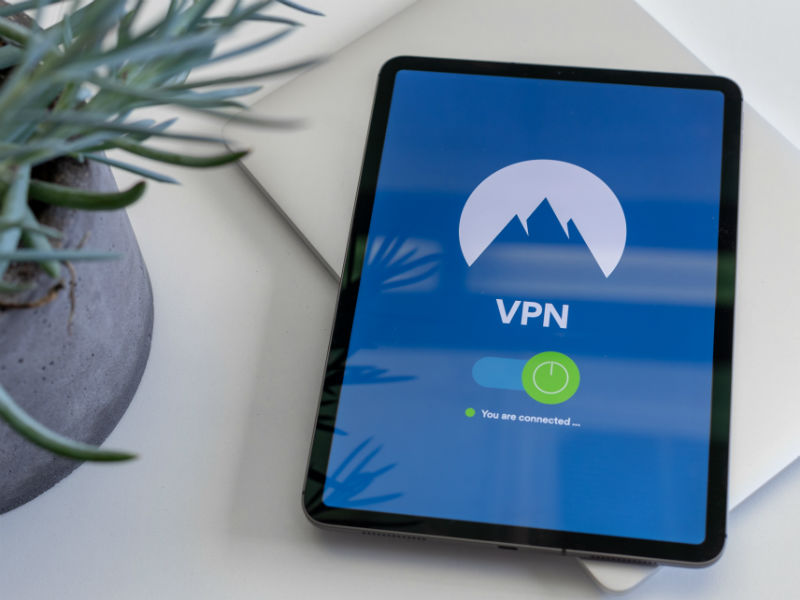
Using a VPN network, you can also access data that may be unavailable in your location. It does this by masking your IP address and using one from a different country. One example where this would be useful is listening to sports abroad.
Many broadcasters have strong restrictions on where they can broadcast live. By using a VPN, even if you are in Turkey, you can pretend to be in Denver and make sure you don’t miss out on seeing the Bronco’s crush the Giants . . . again.
7. Install theft recovery software
If you have theft recovery software in your system, the chances of getting back the stolen or missed laptop are much higher. This software helps you to track and locate your laptop so the local authorized people can recover it.
A premium and advanced theft recovery software could help you even if someone managed to gain access and delete everything from your system.
8. Record your laptop details
When you first buy your laptop, it is a great idea to take note of any registration or serial numbers. Having the laptop manufacturer, model number, or name, and the serial number will help you when you have to report a theft.
Also, it is a very good idea to take photos when you first get your laptop as this will prove the date of purchase should you have to make an insurance claim. Just don’t store those photos on the same laptop.
9. Have backup storage
If you write and use photos extensively for work, I would recommend having two backups, not just one. It is a good idea to have both physical backups in external storage as well as cloud backups.
Although losing a laptop is a massive pain in the arse, it is just a thing that you can replace. What you can’t replace is years worth of work and personal photos. When you lose a laptop, or it breaks and can’t be recovered, this is what really hurt the most.
10. Make sure you use strong passwords
Prepare to avoid unauthorized access to your computer using encrypted data and secure passwords.
A secure password uses a mix of uppercase, lowercase letters, numbers, and symbols*. Try to stay away from names and dates and forget about those obvious replacement characters such as P@ssword. It’s not new, it’s not clever.
If you are bad at remembering passwords, use the password management software.
If you wanted to scare yourself, check out the how secure is my password website and see how long it would take a computer to crack yours.
*For even better tips, check the comments and look for the one from Jim.
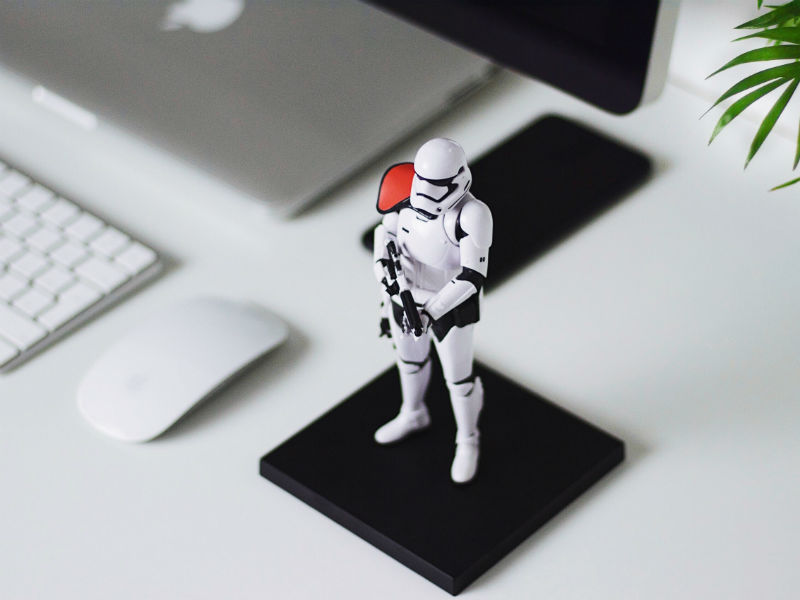
Final thoughts on how to keep your laptop safe while traveling
It is essential to keep your digital travel partner safe while traveling. By using these easy tips above, you should have no trouble, and you and your laptop will live together happily ever after.
If you have found anything in here useful, we would really appreciate a share. But what about you? Do you have any additional tips to share? Or maybe had a laptop stolen? We’d love to know what happened next, feel free to leave a comment.
You Can Also Read:
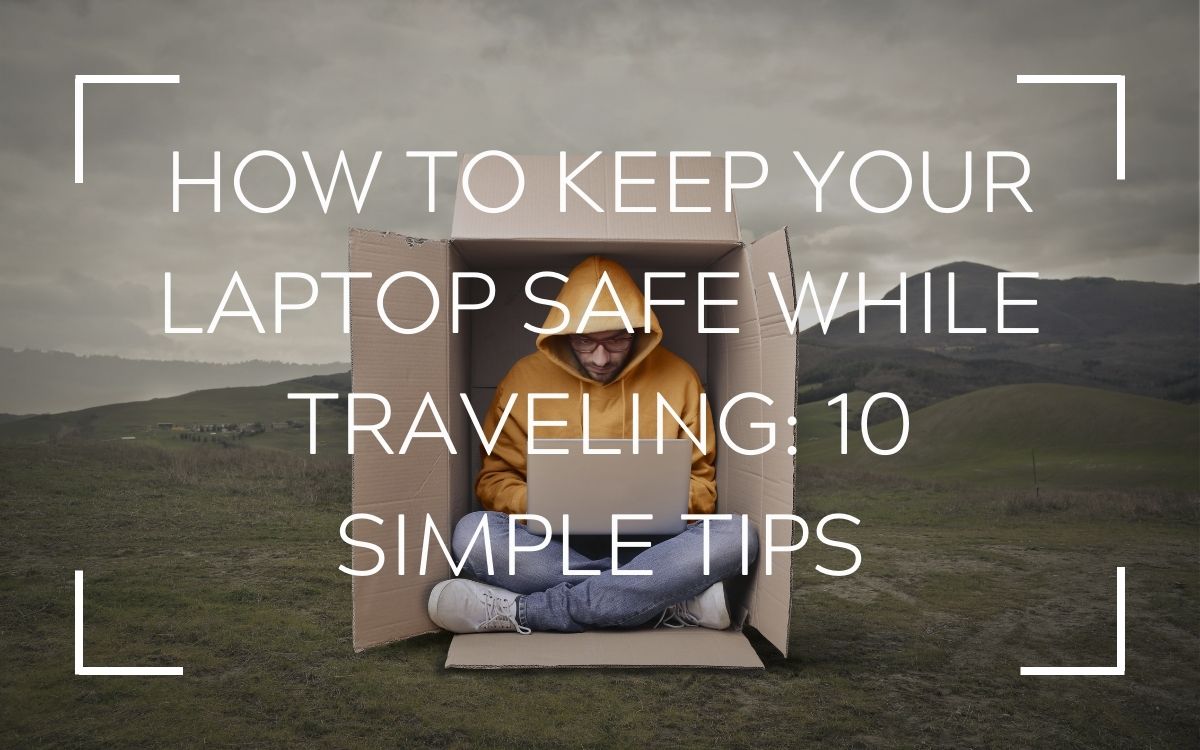
“A secure password uses a mix of uppercase, lowercase letters, numbers, and symbols.” This is false. A secure password is a pass phrase consisting of four or more words of five characters or more each separated by spaces or dashes. These cannot be cracked by current technology in a reasonable time frame. Even better is to get yourself a password manager for which you memorize a single pass phrase and then randomly generate pass phrases for each website which you never have to remember.
That’s a great point and certainly a more secure way to make a password. Also, password managers are a great shout, as long as you have a secure password for your password manager! Thanks for the input and I have edited the main article to ensure it is not lost. All the best.
Safety of laptop is important during traveling. Keep your laptop in the bag and put it on your shoulder every time or in your hand. I have more information about that you can get by visit my page and my website.
I get it from many other websites.
Hy!
your information is very useful and you describe it very well By using these easy tips above, you should have no trouble, and you and your laptop will live together happily ever after. I like your information.
Hey Emma! Your way of explaining tips on how to keep your laptop safe while traveling is extraordinary. I’m sure these tips will work well for people. Keep sharing kinds of stuff like this.